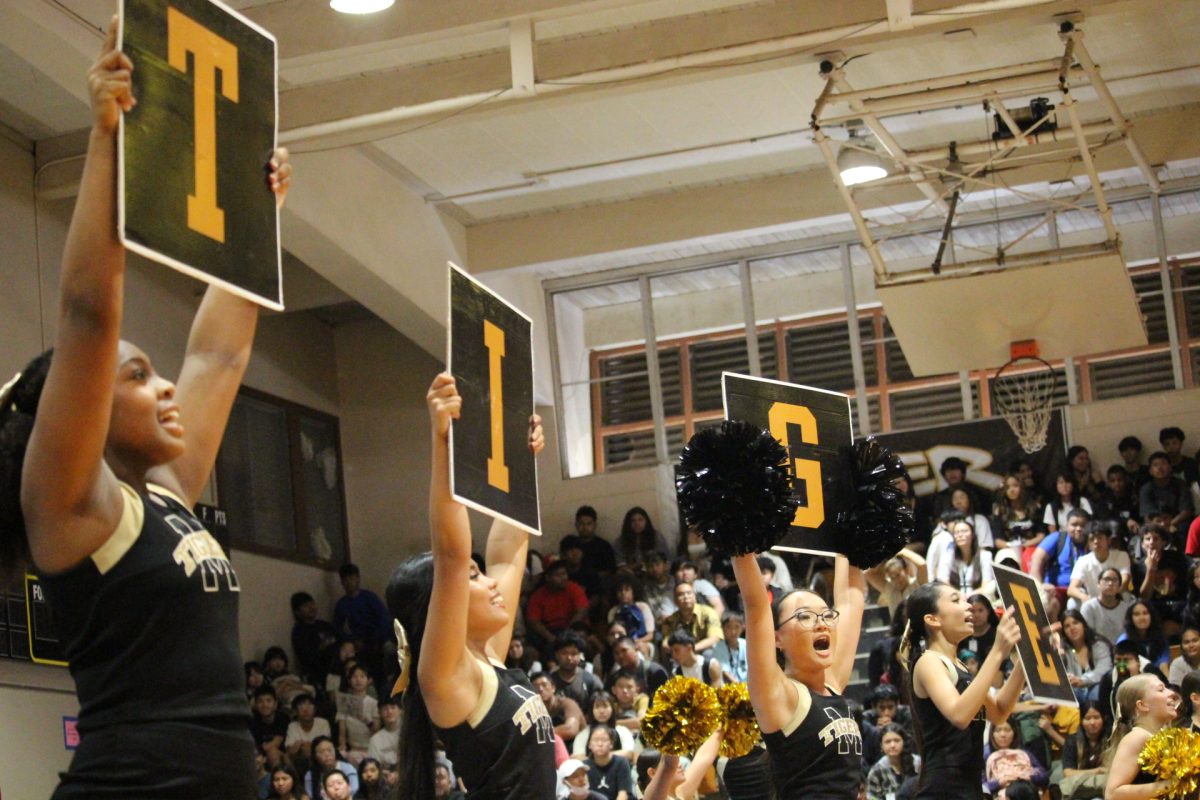Natalia Nieves (c/o 2024) won the second round of McKinley High School’s Poetry Out Loud competition on Jan. 16 in the auditorium. English teacher Jordin Carmichael was the lead coordinator. The school event had three other participants: Shane Kaneshiro, Jerry Tautua, and Winster Bagara (all c/o 2024).
Last year, Nieves went to the state competition to cheer on McKinley’s representative, Justin Nguyen (c/o 2023), which inspired her to join Poetry Out Loud.
“I really liked how everyone was so in their element, so I really wanted to be a part of it,” Nieves said.
Poetry Out Loud is an annual poetry recital program for high school students across the country. According to Poetry Out Loud’s official website, the program aims to encourage the study of great poetry and to help students develop their confidence and public speaking skills, as well as build their knowledge of literary history. In the competition, students memorize and recite a poem for each round of the contest. The state and national-level finals of the competition consist of three rounds each.
This year, McKinley’s competition had two rounds, which were held on separate days. Contestants are judged based on physical presence, voice and articulation, interpretation, and evidence of understanding, as well as overall performance and accuracy, which are weighted slightly more than other criteria.
Carmichael has assisted with organizing the Poetry Out Loud contest for five years, and this was the first year she was the main organizer. She said her favorite thing about hosting the contest is watching the number of participants grow and seeing the contestants’ progress over two months.
Carmichael said she noticed the hardest part of the competition for most students is memorization. She said to overcome this, students should practice in front of other people and ask for advice from teachers and classmates. She encourages students who plan to join next year to talk to her early in order to have more time to get ready.
“Especially when [students] get to the second round and they have to memorize two poems, that can be a lot to keep track of sometimes,” Carmichael said.
To prepare for the contest, Nieves practiced with her parents every night, and they took note of what she did right and what she shouldn’t be doing. The hardest part of the competition for Nieves was having to recite in front of her peers, so she practiced in front of her English class.
“I knew that they weren’t going to judge me too much, so I used [my English class to practice], and that’s one of my biggest classes,” Nieves said.
The most rewarding part of the competition for Nieves was when her name was called as the school winner, and she was proud to show her parents their hard work had paid off. Nieves said she believes the contest is a really good opportunity for students, especially those who struggle with public speaking. She said students who want to participate in the competition should practice a lot.
“It does give you a chance to just be vulnerable,” Nieves said. “And I think once you get over that vulnerability, it becomes like a second nature; you don’t really see the audience, you kind of see yourself… in the audience.”
The in-person state Poetry Out Loud competition was held Feb. 25 at the Tenney Theater at 1 p.m. The three poems Nieves chose for the state-level competition were “American Smooth” by Rita Dove, “The Contract Says: We’d Like the Conversation to be Bilingual” by Ada Limon, and “One Girl” by Sappho. Nieves said she chose “American Smooth” because she loved ballroom dancing since she was young, and she found a safe space in it in high school.
“ I started to romanticize it… in the sense that, like, I love dancing, and it makes me feel safe… and like I can just be myself,” Nieves said. “Being able to translate that in a poem to where the audience can be in that safe space with me… where everything [seems] just lovely and dandy, when it’s not. And I think that’s really nice.”
Nieves also picked “The Contract Says: I’d Like the Conversation to be Bilingual.” When reciting the poem, she wanted to deliver it from the perspective of an insensitive person trying to place an immigrant’s experience in a box. Nieves said the poem resonated with her because as a Hispanic immigrant child, people would try to take advantage of her and act like she was different from everyone else.
“It felt very… ostracizing in a sense, because they expected me to have this, like, big difference [from everyone else] because I’m from a different country and stuff,” Nieves said.
The last poem Nieves chose to memorize was “One Girl,” which was her friend’s choice. Nieves said she wanted to do a poem which her friend really liked to show her appreciation for the help she gave her with the competition.
“She helped me a lot throughout the whole Poetry Out Loud [competition], and I just wanted to appreciate her and… how much she helped me,” Nieves said.
Nieves said one piece of advice she was given before the state competition that stuck with her was from her mother, who reminded her to be proud of all the work she put in to prepare, no matter what the outcome of the competition was.
“[She texted me a it doesn’t matter what happens or what is going to happen, it just matters how much time and how much effort you put in to really portray what you put on stage, and that the stage is my scene, and to always be proud of what I put out there,” Nieves said.
The winner of the competition, Jordyn Imig from Hanalani Schools, was awarded $200 as well as a fully-funded trip to Washington, D.C. to compete at the national-level competition held from Apr. 30 to May 2. The winner’s school will receive $500 to be spent on poetry materials. The runner-up, Koali’i Keawe-Asuega from Kamehameha Schools Kapālama, was awarded $100, with $200 to go to their school to be spent on poetry materials.
“I really want to thank the whole English department, especially [Evon] Le, [Jordin] Carmichael, and [Cynthia] Reves for being able to put time and… energy into me and I really believe that they’re great teachers in that sense,” Nieves said. “Although they may be strict inside the classroom they really do care about their students, and I think that really shows their encouragement.”











